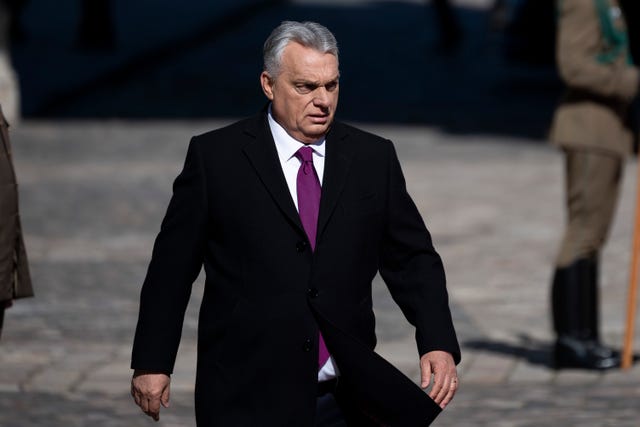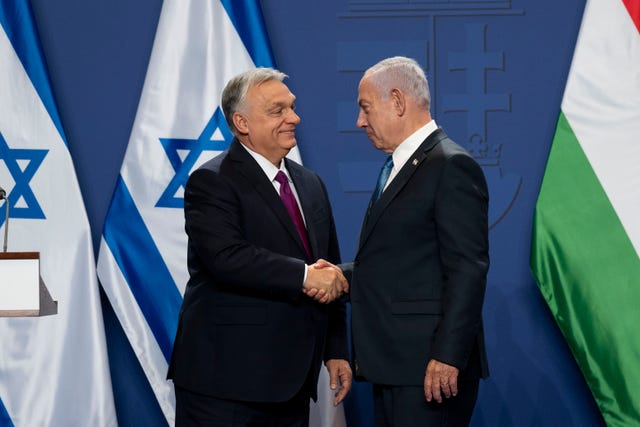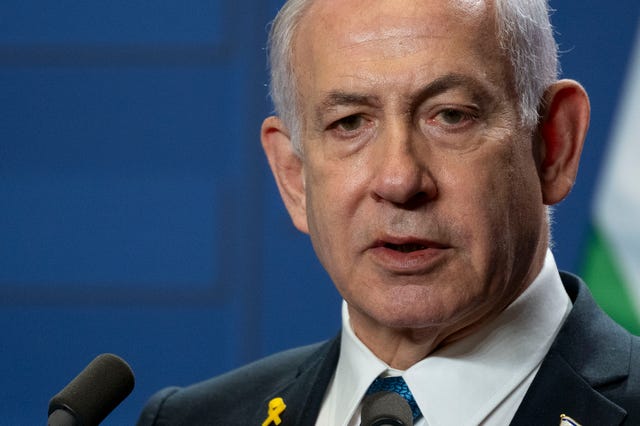Netanyahu in Budapest despite arrest warrant as Hungary says it will quit ICC

Israeli Prime Minister Benjamin Netanyahu arrived in Hungary’s capital to red carpet treatment despite a warrant for his arrest issued by the world’s top war crimes court.
It was only the second foreign trip Mr Netanyahu has made since the International Criminal Court issued the warrant against him in November.
As Mr Netanyahu arrived in Budapest on Thursday, Hungary said it will begin the procedure of withdrawing from the ICC.

“Hungary will withdraw from the International Criminal Court,” Gergely Gulyas, Prime Minister Viktor Orban’s chief of staff, wrote in a brief statement.
“The government will initiate the withdrawal procedure on Thursday, in accordance with the constitutional and international legal framework.”
Mr Netanyahu was greeted with full military honours in the Castle District of the capital Budapest, where he stood alongside Mr Orban as a military band played and processions of soldiers on horseback and carrying swords and bayoneted rifles passed by.
The two leaders were set to hold talks later on Thursday.
Mr Netanyahu will spend several days in Hungary before departing on Sunday.
The ICC, based in The Hague, Netherlands, said there was reason to believe Mr Netanyahu and former Israeli defence minister Yoav Gallant used “starvation as a method of warfare” by restricting humanitarian aid to the Gaza Strip, and intentionally targeted civilians in Israel’s campaign against Hamas — charges that Israeli officials deny.

Member countries of the ICC, such as Hungary, are required to arrest suspects facing a warrant if they set foot on their soil, but the court has no way to enforce that and relies on states to comply.
After the ICC issued the warrant in November, Mr Orban accused the world’s only permanent global tribunal for war crimes and genocide of “interfering in an ongoing conflict for political purposes”, saying the move undermined international law and escalated tensions.
His invitation to Mr Netanyahu was in open defiance of the court’s ruling.
Hungary joined the court in 2001 during Mr Orban’s first term as prime minister.
Mr Netanyahu in February met US President Donald Trump in Washington DC, where Mr Trump suggested that displaced Palestinians in Gaza be permanently resettled outside the war-torn territory and proposed the US take “ownership” in redeveloping the area into “the Riviera of the Middle East”.
Neither the US or Israel are signatories to the ICC.

Mr Trump in February issued sanctions against the court for its investigations into Israel’s conduct of the war in Gaza which has killed tens of thousands of Palestinians, many of them children.
– Orban says ICC is ‘no longer an impartial court’
At a news conference following their meeting, Mr Orban said that he believes the ICC is “no longer an impartial court, not a court of law, but a political court. And this was most clearly shown by the decisions regarding Israel”.
“I am convinced that this otherwise important international judicial forum has been degraded into a political tool, with which we cannot and do not want to engage,” Mr Orban said.
The Hungarian leader, regarded by critics as the EU’s most intransigent spoiler in the bloc’s decision-making, is seen as using some of the tactics that Mr Netanyahu has been accused of employing in Israel: subjugation of the judiciary, antagonism toward the EU and cracking down on civil society and human rights groups.
During the news conference, where journalists were not permitted to ask questions, Mr Netanyahu praised Hungary’s decision to withdraw from the ICC, thanking Mr Orban for taking a “bold and principled decision”.
“The ICC directs its actions against us fighting a just war with just means,” Mr Netanyahu said.

“You are the first… state that walks out of this corruption and this rottenness, and I think it’ll be deeply appreciated, not only in Israel but in many, many countries around the world.”
– Israeli leader faces growing problems at home
Mr Netanyahu’s visit to Hungary was his second opportunity to travel abroad following the issuance of the warrant — the first was when he met with US President Donald Trump in Washington DC in February.
It was also a chance to project an image of statesmanship while he faces mounting discontent at home.
Mr Netanyahu has faced mass protests by Israelis who fear his decision to resume the war in Gaza endangers the lives of the remaining hostages held by Hamas.
He has also sparked anger by trying to fire or side-line top officials in what critics view as a power grab and an attack on state institutions.
Along with resuming its offensive in Gaza last month, Israel halted all imports of food, fuel and humanitarian aid to the territory’s two million Palestinians to pressure Hamas to release more hostages and accept proposed changes to the truce agreement.
The ICC has criticised Hungary’s decision to defy its warrant for Mr Netanyahu.
The court’s spokesperson, Fadi El Abdallah, earlier said that it’s not for parties to the ICC “to unilaterally determine the soundness of the Court’s legal decisions”.
On Thursday, he said that the court “recalls that Hungary remains under a duty to cooperate with the ICC”.






